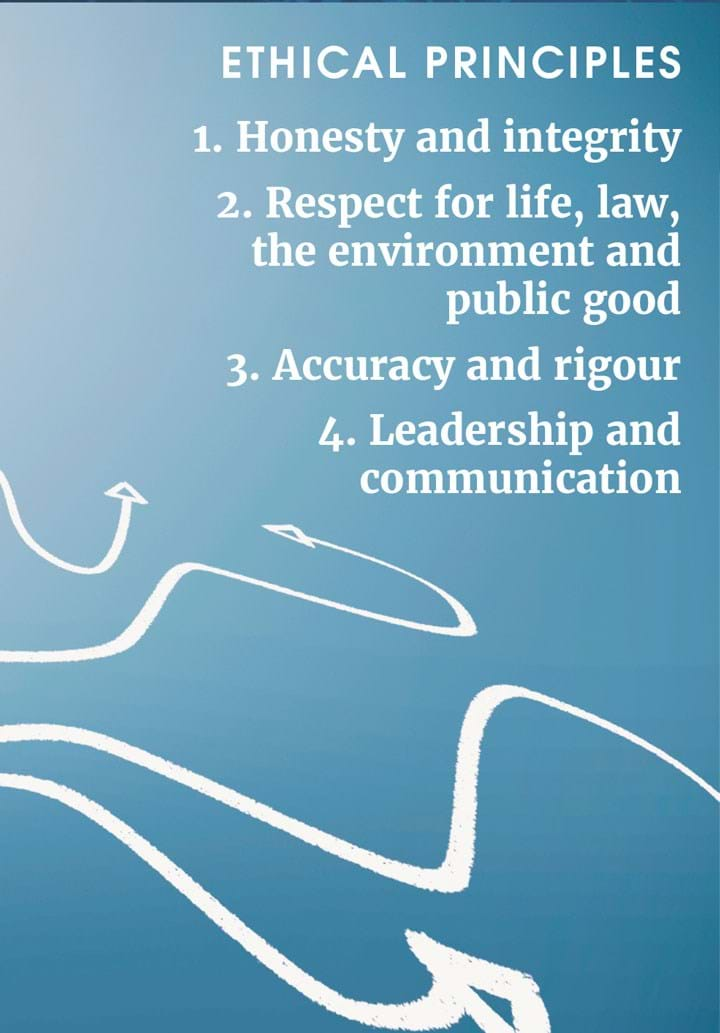Ethics Series Introduction: Ethics and the Chemical Engineer


David Bogle and Raffaella Ocone introduce a new series of articles urging chemical engineers to ‘think ethics’ before taking action
We like to think of chemical engineering as an ethical profession. The decisions we make in our professional lives scale from everyday technical selections through to larger decisions affecting infrastructure, communities, and ultimately climate change and the planet. In making our decisions we face inevitable tensions between profitability, sustainability and safety, which we seek to balance. But where do we draw the line? And are we preparing and supporting colleagues and training new professionals in navigating these tensions? Responding to requests from TCE readers for more articles on ethics, these are some of the questions that this new series explores.
Mistakes have been made
Professional engineers and technicians set out to get things right. However, there have been some notable failings in recent years, and social media has amplified public scrutiny. Technical concerns about the Boeing 737 Max – where failures caused two fatal crashes that killed more than 300 people – were raised and yet they were not acted on. Volkswagen falsified the environmental tests of its diesel engines. Its engineers knew but did not feel able to raise their concerns. In her report on the Grenfell Tower tragedy, IChemE Past President Dame Judith Hackitt outlined several factors that “have helped to create a cultural issue across the sector, which can be described as a ‘race to the bottom’ caused either through ignorance, indifference, or because the system does not facilitate good practice.” All these raise ethical questions for the engineers involved and for the companies that employ them and their leadership.
Closer to our discipline, many years ago chemical engineers were at the heart of a major disaster at Bhopal in India where a leak of methyl isocyanate killed and injured thousands in the surrounding community. The plant operated to local safety standards rather than the higher standards that the company operated to elsewhere. Should it have been using international standards? Were the chemical engineers challenging the standards that were being used locally? An ethical approach should have encouraged engineers to raise concerns and drive up standards. The ramifications sounded the death knell for the company, and they still resonate today.
The way we consider ethics in engineering must shift from the conventional approach of reflecting on historical mistakes to systematically looking ahead to anticipate the consequences of our work

Our impacts may be hidden
The situation is made more complex when it comes to the use of emerging technologies. Their use can have hidden, unwanted consequences. New technologies and the ways they are used are often evolving quickly and in the race to apply them, considerations about the ethical ramifications are often left behind. It is not only the misuse of a given technology that needs to be considered, since inequalities can be created just through ordinary use. Industrial automation gives greater responsiveness and creates efficiencies but has consequences for employment. Analysis by PwC estimates that 26% of jobs in manufacturing could be automated by the late 2020s, with female workers and those without higher education qualifications likely to be most affected. Lack of internet access has caused significant disparities in access to services and education. Apps used by companies like Uber have lowered the barriers to employment but also eroded employment rights. The list goes on.
What can we consider doing to help remedy or alleviate these impacts? Would it be helpful if we had a mechanism to pause the development of a new technology if, or when, we become concerned about the creation of unethical consequences? Is there more we can do to engage closely with policymakers to highlight potential ethical dilemmas and help them proactively create better regulations? Regardless of the mechanisms we choose to promote, it is important to be proactive. The way we consider ethics in engineering must shift from the conventional approach of reflecting on historical mistakes to systematically looking ahead to anticipate the consequences of our work.
Ethical issues confront us every day
If you have any doubts that ethical decision-making affects everyday actions, have a look at the article by Shallcross and Parkinson on teaching ethics to chemical engineers (https://doi.org/cd8qzr). They give some examples to provoke discussion among students: in product testing, in discovering a flawed design, and in becoming aware of a conflict of interest. Ethical behaviour is even embedded in our everyday personal interactions with colleagues.
While those issues may seem small, their impacts can be anything but. On top of these we face more obvious ethical choices when it comes to climate change, the development of autonomous vehicles, corruption, and the need for increasing diversity in the engineering workforce. These are among the issues driving a greater focus on ensuring that ethics is considered in decisions involving engineering and engineers. Not taking care of the ethical issues can lead to major consequences down the line. There are many lawsuits in play that question the knowledge that oil majors had of the consequences of the use of fossil fuels and whether they supressed these findings (https://bit.ly/3DKI7Ob). It seems they borrowed the playbook from Big Tobacco. The legal system forced huge levels of compensation for the effects of the drug thalidomide because the producer knew of the effects but did not act. There are countless examples where companies break the rules because it’s cheaper to pay the fines than act responsibly.
We are trusted – but we need to work harder
Given that engineers make up a significant portion of the people employed by the companies caught up in these high-profile issues, how are we viewed by the public and what guidelines do we have in place to help guide our actions?
According to the 2018 Ipsos MORI veracity index, engineering is seen as “trustworthy” by a significant 87% of the population, making it the fourth-most trusted profession in the UK, closely following nurses, doctors and teachers. The profession employs one in five people in the UK. The survey has tracked trust in the key professions since the 1980s but 2018 saw the first explicit inclusion of engineering. We are trusted but will greater scrutiny see this maintained? It is up to us to ensure that this is so.
Ethics has been a keen point of focus with a series of recent meetings by senior engineers in the community working together to help enhance ethical behaviour. In 2003 the Royal Academy of Engineering and the Engineering Council issued their Statement of Ethical Principles (https://bit.ly/3KcOufC). There are four basic principles: honesty and integrity; respect for life, law, the environment and public good; accuracy and rigour; and leadership and communication. IChemE offers some materials and training, and during accreditation, ethics is now a cross-cutting topic alongside safety and sustainability.
More recently the Royal Academy of Engineering and the Engineering Council established the Engineering Ethics Reference Group to have “a strategic-level remit with a leadership and advisory role, to shape the profession’s ethics-related activity and steer an enhanced culture of ethical behaviour amongst those working in engineering”. In February the group delivered its report along with a series of actions. We were members of this group, with David Bogle as its Chair.
Ethics before action
The report puts forward a series of actions under four headings: Leadership; Professionalism; Education and Training; and Engagement. Leadership is essential for sustaining a culture which encourages ethical behaviours within all aspects of engineering practice. Leadership can be practised across all levels of the engineering profession not merely by senior members. At all levels – from the most junior to the most senior – we all have a role in questioning practice where we think there may be challenging ethical issues. It requires all to reinforce this culture. Professionalism refers to embedding ethical practice in engineers’ work and in reflecting on our own practices. Education and training refers to the formal elements of preparation and continual development of ethical practice. Engagement actions aim to enhance communications with wider society.
All four are central to ensuring that chemical engineers think ethics before taking action. In this series we will be hearing from some senior members of the chemical engineering community who will be discussing their experience and perspective on engineering ethics. Each will focus on one of these four topics. In this issue, Dame Judith Hackitt discusses leadership.
We hope that this will spark debate and actions to help ensure that we retain society’s trust. The sustainability challenges need chemical engineers at the heart of finding and implementing solutions that have broad confidence in society; solutions that are not only technically correct but also ethically just and have broad support. From the protestors at COP26 to the undergraduates we teach at university, we are seeing the younger generation clearly articulate their concerns. Embedding ethics is crucial if we wish to continue recruiting talented students into chemical engineering education and on into industry to help society address these challenges in an ethical manner.
Ethical toolkit
In conjunction with RAEng, the Engineering Professors Council has compiled an Engineering Ethics Toolkit, a growing resource designed to help engineering educators integrate ethics content into teaching.
http://epc.ac.uk/ethics-toolkit/
This article is part of a series on engineering ethics. For more articles, visit the series hub at: https://www.thechemicalengineer.com/tags/Ethics-and-the-Chemical-Engineer
Recent Editions
Catch up on the latest news, views and jobs from The Chemical Engineer. Below are the four latest issues. View a wider selection of the archive from within the Magazine section of this site.




